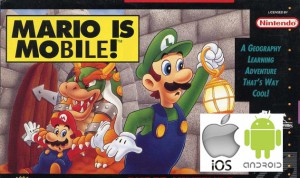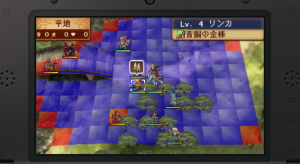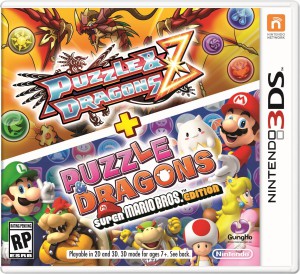Mario is Mobile!: Or (Nintendo’s Platform Panic?)
 Within the context of video game culture, Nintendo’s corporate identity has been clear: Nintendo makes games. Whereas competitors Sony and Microsoft represent larger global technology corporations in which gaming is but one portfolio among many, Nintendo has distinguished itself through its singular focus on its home and handheld gaming consoles and making games exclusively for them.
Within the context of video game culture, Nintendo’s corporate identity has been clear: Nintendo makes games. Whereas competitors Sony and Microsoft represent larger global technology corporations in which gaming is but one portfolio among many, Nintendo has distinguished itself through its singular focus on its home and handheld gaming consoles and making games exclusively for them.
In recent years, part of this identity has become Nintendo’s resistance to the convergence of gaming and mobile technologies. Despite consistent analyst and investor pressure for Nintendo to take advantage of the explosion of gaming on phones and tablets to help offset a downturn in console performance, Nintendo resisted, with President and CEO Satoru Iwata going as far to suggest in 2013 that “If we think 20 years down the line, we may look back at the decision not to supply Nintendo games to smartphones and think that is the reason why the company is still here.”
It was therefore surprising when Nintendo announced a partnership with Japanese mobile platform developer DeNA to move into the mobile gaming space. There had been no warning that Nintendo’s philosophy on this issue had changed, even at a recent investor briefing in Tokyo. Suddenly, Nintendo has plans to have games available for mobile platforms by the end of the year, with Mario, Link, and other Nintendo characters in games competing with the likes of Clash of Clans and Game of War. While initial speculation questioned if Nintendo would play any type of development role, or if their biggest franchises would be involved, when the dust settled it was clear: developers at Nintendo are at work creating mobile games utilizing a limitless range of Nintendo IPs, which DeNA will make available across a wide range of platforms.

The gameplay of the Fire Emblem series—and other Strategy RPGs from developer Intelligent Systems—is a logical fit for touch-screen gaming.
There is no shortage of response to this news: indeed, the level of mainstream press engagement with Nintendo’s decision reveals the degree to which Nintendo franchises have the potential to do extremely well in the mobile space. Within the gaming enthusiast press, meanwhile, sites immediately began speculating on what franchises would be a great fit for mobile gaming, imagining games like the Strategy RPG Fire Emblem as perfect fits for the mobile space. However, at the same time, others—like WIRED’s Chris Kohler—pointed out that those imagining a game like Fire Emblem on mobile platforms are overlooking the realities of mobile gaming, and that Nintendo is more likely to develop streamlined F2P (Free to Play) games that cost less to make, have endless revenue potential, and don’t directly compete with Nintendo’s existing handheld games (like an upcoming Fire Emblem title set to release on Nintendo 3DS later this year).
Nintendo, for their part, is remaining vague. The announcement notably came without the reveal of a single mobile game, and in a feature interview with TIME Iwata offered little detail regarding Nintendo’s specific plans beyond the fact that “we believe that we will be able to use smart devices in a very unique way so that they can be a bridge to our dedicated game systems, and at the same time, that we will be able to deliver unique experiences to the users of smart devices.” When pushed on the types of payment models, Iwata was similarly cagey, leaving the door open for “free-to-start” games —a term less common than “free-to-play,” and most recently associated with “Full Game Demos” on consoles—while simultaneously noting that “it’s even more important for us to consider how we can get as many people around the world as possible to play Nintendo smart device apps, rather than to consider which payment system will earn the most money.”

Nintendo’s relationship to licensed mobile gaming could be previewed by a Mario-themed version of iOS title Puzzle & Dragons, which developer GungHo is bringing to Nintendo’s 3DS later this year.
Here, I would argue, we see the inherent tension in Nintendo’s announcement. The reason no games were announced is because this is a business decision as opposed to a gaming one. Nintendo is effectively licensing their IPs onto mobile devices as a way of extending their franchises to new audiences—Iwata’s emphasis on global reach makes clear that this decision is about using the proliferation of mobile devices as a new awareness platform, with no plans to port existing games onto the systems (which has been a pattern for other game creators like Final Fantasy developer Square Enix). In this way, it is framed similarly to an animated film deal Nintendo was allegedly pursuing with Sony (as revealed in the midst of 2014’s Sony Hack), with mobile devices less a new gaming platform—signaling Nintendo abandoning exclusively developing for its own hardware platforms—than a new way of leveraging and promoting existing IP. This business decision was well-received, with Nintendo stock leaping 27% following the announcement.
At the same time, though, Nintendo is still committed to games. And so while from a business perspective it would make sense for Nintendo to treat mobile as a space of licensing, with other developers creating games using its franchises, the company’s larger commitment to being a “game company” doesn’t allow them to do so. In addition to announcing Nintendo’s next piece of hardware—Project NX—to renew their commitment to their own platforms, Iwata is promising Nintendo’s innovation will extend to mobile gaming, telling TIME that “while we want more people to become familiar with Nintendo IP through Nintendo’s smart device game apps, at the same time, we aim to provide smart device consumers with unique experiences with our game apps.”
Whether or not Nintendo can transform licensed mobile gaming into a space of innovation remains to be seen, but for now discursive transformation is the next best thing. Nintendo needs to acknowledge the evolution of mobile gaming as a threat against their existing handheld gaming business, but they are doing so in ways that frame mobile gaming as a lesser space that Nintendo needs to elevate, and which exists to compliment—rather than threaten—existing distribution models. The long-term tenability of this position remains unclear, but the increased mobility of Mario and the rest of Nintendo’s brand is set to give us our answer.


